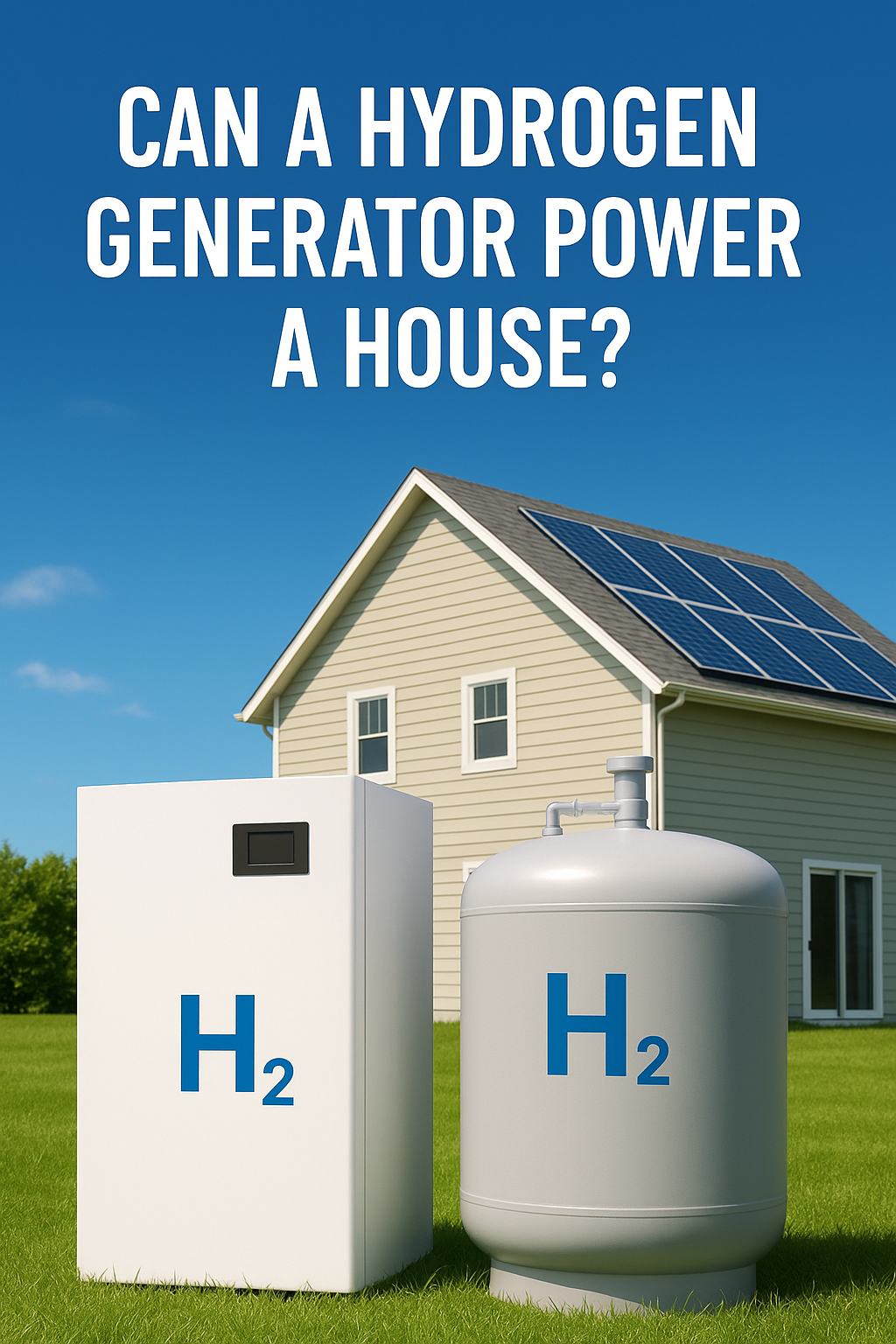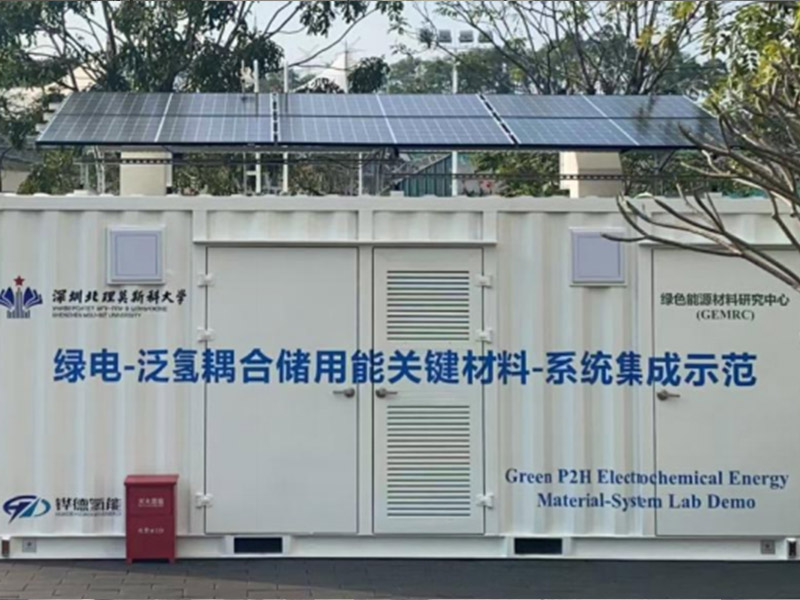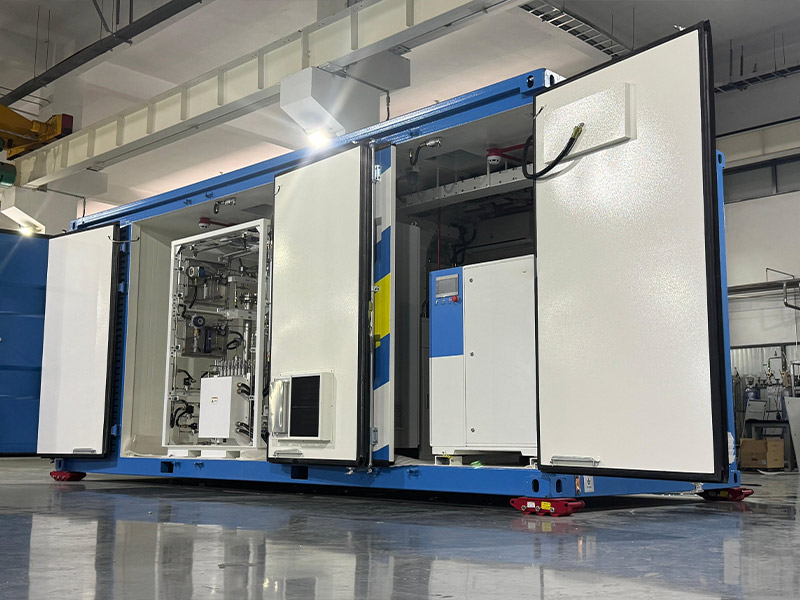As the world transitions to cleaner energy sources, many homeowners are asking a vital question: Can a hydrogen generator power a house? The answer is yes—thanks to advances in hydrogen technology, especially when paired with solar power, hydrogen generators are becoming a practical solution for off-grid and sustainable home energy.
This article explores how hydrogen generators work, their benefits, and why solar-powered hydrogen is emerging as a game-changing solution for residential energy.

Keypoints
l Solar-powered hydrogen generators enable fully off-grid living by storing excess solar energy as hydrogen for long-term use.
l Hydrogen systems outperform batteries in longevity, offering weeks/months of storage without degradation.
l Versatile energy use—hydrogen powers electricity, heating, and even vehicles through fuel cells.
l Higher upfront costs but long-term savings, as hydrogen infrastructure scales and technology improves.
l Best suited for energy-independent homes, remote areas, or those prioritizing sustainability over short-term ROI.
l Safety is comparable to propane systems, with modern tanks and sensors minimizing risks.
l A future-proof investment—hydrogen aligns with global decarbonization goals and renewable energy trends.
A hydrogen generator, also known as a hydrogen fuel system or electrolyzer, is a device that produces hydrogen gas by splitting water into hydrogen and oxygen using electricity—a process called electrolysis.
When powered by renewable energy such as solar panels, this system becomes a solar-to-hydrogen energy loop, which is not only sustainable but also free of carbon emissions.
|
Parameter |
Typical Home System |
Notes |
|
Power Output |
1-5 kW continuous |
Enough for basic needs |
|
Storage Capacity |
5-20 kg H₂ |
3-7 days of backup |
|
System Efficiency |
30-45% round-trip |
From solar to usable power |
|
Space Required |
10-20 m² |
Excluding solar panels |
Yes, a hydrogen generator—especially when paired with solar panels—can provide enough energy to power a house. A typical residential hydrogen energy system includes the following components:
Solar Panels: Collect solar energy during daylight hours.
Electrolyzer: Uses solar electricity to produce hydrogen from water.
Hydrogen Storage Tank: Safely stores the hydrogen gas for later use.
Fuel Cell System: Converts stored hydrogen into electricity and heat on demand.
Such systems can generate electricity for appliances, lighting, and electronics, and also provide heating and hot water through combined heat and power (CHP) technology.
Pairing a hydrogen generator with solar power offers several advantages over conventional energy systems:
Hydrogen systems allow you to go completely off-grid. You're no longer reliant on utility companies or subject to grid outages.
Unlike batteries that discharge quickly or degrade over time, hydrogen can be stored for weeks or even months without energy loss.
When produced using solar energy, hydrogen emits zero carbon emissions, making it an ideal choice for climate-conscious homeowners.
Hydrogen generators can be scaled to suit small homes or large residential properties.
Stored hydrogen can also be used for heating, cooking, and even fueling hydrogen-powered vehicles.
While batteries (like lithium-ion) are the most common form of home energy storage today, hydrogen presents a unique advantage—it’s better suited for long-term and high-capacity storage.
|
Feature |
Batteries |
Hydrogen Storage |
|
Duration |
Short-term (hours) |
Long-term (days to months) |
|
Energy Density |
Lower |
Higher |
|
Degradation Over Time |
Yes |
No |
|
Eco-Friendly |
Moderate (depends on materials) |
High (when solar-powered) |
✅ Remote locations - Where grid connection is impossible
✅ Large properties - With space for equipment
✅ Preppers/survivalists - Long-term backup power
✅ Early adopters - Willing to pay premium for innovation
Many experts believe that combining solar panels with hydrogen generation will be a cornerstone of future residential energy systems. Unlike batteries, which are ideal for short-term storage, hydrogen offers a sustainable solution for seasonal or long-term energy storage.
With the right system in place, a homeowner can:
l Capture surplus solar power during sunny months
l Store the excess energy as hydrogen
l Use that hydrogen to power the home throughout the night or in winter
This solar hydrogen cycle is a closed-loop solution that is clean, efficient, and aligned with global net-zero goals.
Conclusion
So, can a hydrogen generator power a house? Yes—and even better when combined with solar power. Solar hydrogen systems offer clean, reliable, and long-lasting energy, making them an ideal solution for future-ready, sustainable homes.
As infrastructure improves and awareness grows, hydrogen-powered homes could become a mainstream option—especially for those seeking energy independence and zero-emission living.
1. Can a hydrogen generator fully power a house?
Yes—when paired with solar panels, a hydrogen system can provide electricity, heating, and hot water, especially in off-grid or large homes.
2. How does a solar-powered hydrogen generator work?
Solar panels power an electrolyzer to split water into hydrogen, which is stored and later converted back to electricity via fuel cells.
3. Is hydrogen storage better than batteries for homes?
For long-term storage (weeks/months), yes—hydrogen doesn’t degrade like batteries, but it’s less efficient (30–45%) for daily cycling.
4. What are the main benefits of hydrogen home systems?
Energy independence, zero emissions, multi-use (power/heat/vehicle fuel), and resilience during grid outages.
5. How much space does a hydrogen system need?
About 10–20 m² for the generator and storage, excluding solar panels—ideal for larger properties.
6. Is hydrogen safe for residential use?
Yes, with proper tanks, leak detectors, and ventilation—similar safety standards to propane systems.
7. Who should consider a hydrogen home system?
Off-grid households, remote locations, or early adopters willing to invest in future-proof energy.
8. How much maintenance does a hydrogen generator system require?
Hydrogen systems need minimal maintenance—primarily periodic checks of electrolyzers, storage tanks, and fuel cells, similar to maintaining a solar panel system with battery storage.
9. Can I use my existing solar panels with a hydrogen generator?
Yes! Most hydrogen electrolyzers can integrate with standard solar PV systems, though you may need to expand your solar array to account for the extra energy needed for hydrogen production.
10. What happens during long cloudy periods when solar production is low?
With proper sizing, your hydrogen storage should carry you through several days of low sunlight, but you may need a backup power source (like a small battery bank) for extended cloudy stretches in winter months.


